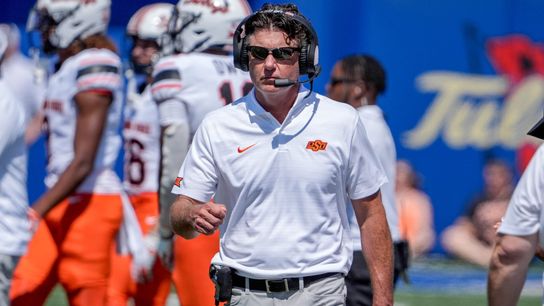Realistically speaking, it's hard to imagine the 2021 football season playing out any better than it did for the Big 12. Let us count the ways:
1. Baylor beat Oklahoma State in a classic Big 12 title game -- won with hard-hitting defense, not offense. That 21-16 game was the first time someone other than Oklahoma or Texas won the Big 12 Championship since Kansas State in 2003 (the league didn't stage a championship game from 2011-16, and Baylor won back-to-back league crowns in 2013-14, and OSU won the league in 2011.) The Bears slayed Ole Miss in the Sugar Bowl and the Cowboys toppled Notre Dame in the Fiesta.
2. Texas Tech dunked on former coach Mike Leach in the Independence Bowl and reinvigorated its fan base by hiring Joey McGuire
3. Kansas State won eight games and blew out LSU in the Texas Bowl.
4. Kansas showed signs of life for the first time in forever under first-year coach Lance Leipold, defeating Texas in Austin (lol) and scaring the life out of Oklahoma.
5. Incoming members Cincinnati, Houston and BYU had outstanding seasons. Cincinnati shattered the CFP glass ceiling and acquitted themselves well against Alabama, Houston squared off with Cincy in the AAC title game, and BYU won 10 games for the second straight season.
6. Current and future Big 12 members occupied six spots in the final AP Top 25, and three of the top seven: No. 4 Cincinnati, No. 5 Baylor, No. 7 Oklahoma State, No. 10 Oklahoma, No. 17 Houston and No. 19 BYU.
7. Last but certainly not least, Texas and Oklahoma imploded in separate but equally satisfying ways.
8. Since it's March, it bears mentioning the conference's success on the hardwood, too. Kansas, Texas Tech and Iowa State will play in the Sweet 16 this weekend (along with future member Houston, who reached the Final Four last season). Baylor is still the reigning national champion and a 1-seed that suffered a Round of 32 upset to North Carolina.
The future Big 12 will admittedly have a tough time winning national championships in football... but that's not all that different than the present, anyway. The conference hasn't played for a national title since 2009 and last won it in 2005 -- the end of a different era in college football, before the SEC became a superpower that towers over the rest of the support.
From a financial perspective, the Big 12 will be well behind the SEC and the Big Ten, but still very much a viable conference that will have no trouble keeping the lights on. On the field, it's hard to imagine a league being more competitive -- week to week, season to season -- than the Big 12. With OU out of the picture, the gap between the best team and the worst team figures to be smaller in this conference than any other. There isn't one school with the resources to tower over the others, and so each season figures to boil down to which teams have the right experience, talent, coaching and fortune to rise up and win the league. It's easy to envision five different programs winning the Big 12 over a 5-year span.
In short, the Big 12 figures to have lots more 2021s in its future.
As of this moment, the conference will remain at 10 in 2022. BYU comes aboard in 2023. Cincinnati, Houston and UCF will join by 2024 at the latest, and the Red River rivals will remain in the conference through the '24 season. So, the conference will go from 10, to 11, to 14 in successive seasons, but by 2025 the Big 12 will once again be a 12-team league for the foreseeable future.
Or will it?
Mike Gundy said this to The Oklahoman on Tuesday:
“We could be at 14 very easily, five years from now, from what I’m hearing."
Oh?
“I think there’s strength in numbers. When you watch this thing, the Big 12 always had some issues, because people would say, there’s only 10 (members).”
Former Oklahoma president David Boren said in 2015 the conference was "psychologically disadvantaged" as a 10-team league, and that perception never really went away. There's an argument to be made that less is more from a financial perspective, but with the SEC at 16, the Big Ten at 14, and the ACC at 14 (with Notre Dame as a partial member), the thinking is that the more rocks you have to throw at the college sports establishment, the better.
“I think there’s strength in numbers,” Gundy said. “I’m speaking out of turn here, because (Big 12 commissioner Bob) Bowlsby didn’t tell me this. When I just read between the lines, and listen to what people say, including him, even though he’s not speaking directly to the subject, there’s strength in numbers."
For what it's worth, Bowlsby never closed the door on further expansion when the Big 12 accepted its four new members last summer.
So, now it's time for the Internet to do what the Internet does best. Boise State was considered the last time around and figures to be a favorite to land a potential 13th Big 12 spot. What about No. 14? Memphis? SMU? What about Colorado State or Air Force? How about a school like Louisiana or Florida Atlantic? Let's get that rumor mill cranking, folks.
